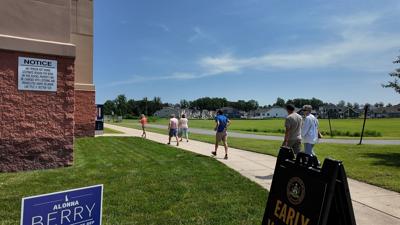SUSSEX COUNTY, Del. - Delaware Election Commissioner Anthony Albence has issued a response to questions posed by the Republican Party regarding absentee ballots and an incident involving an election officer at Mariner Middle School.
Absentee Ballots and Undervotes
Albence stated that a voter’s intent when completing an absentee ballot is known only to the voter. He acknowledged that in all elections, ballots are sometimes returned without a choice made in all contests, or entirely blank. In the recent special election in question, which included only one contest, this pattern was still observed.
He also noted that 1,138 absentee ballots were sent to voters with permanent absentee status. These voters automatically receive absentee ballots for all elections in which they are eligible to vote, without needing to request one each time.
Permanent absentee status is granted when a voter submits a request with a qualifying reason and indicates a desire to continue voting absentee. This status remains active until the voter opts out or if election-related mail is returned as undeliverable.
Albence suggested that for some voters, maintaining an uninterrupted voting history may be a reason for returning a blank ballot.
He further stated that all absentee ballot procedures opening, preparation, and scanning were conducted in accordance with the Delaware Code, during properly noticed public meetings open to the public.
Election Officer Issue at Mariner Middle School
Regarding a reported incident at Mariner Middle School, Albence said the Sussex County office determined that a judge of election refused to sign the machine opening tapes, stating he had not witnessed those actions because he was assisting with another task. The polling place inspector apologized after realizing the individual was acting in a judge role and had been occupied with another aspect of opening procedures.
Later in the day, the same judge refused to sign the closing tapes, stating he had not been consulted regarding the closing. The inspector reported that the judge was generally not engaged as an election officer during the day. The Sussex County office expressed disappointment and reaffirmed that the expectation is for all election officers to be engaged throughout the day and to complete all required tasks, including documentation.
Albence noted that in such cases, the county office contacts the polling place inspector to gather a recap and uses the information to improve future procedures. This can include revising training materials or updating election officer training presentations. All election officers are required by Delaware Code to attend training before serving in any election, regardless of previous experience.
The department emphasized that election officer training highlights the importance of active participation, leadership roles for inspectors and judges, open communication, and thorough documentation.After each election, county offices review all polling place documentation to ensure completeness and incorporate lessons learned into future training.
Albence also referenced a 2019 amendment to Delaware Code, Title 15, Chapter 47, which streamlined the process for appointing election officers by removing the requirement for party balance among judges and clerks.
He noted that the change aimed to allow more individuals including those not affiliated with a major party to serve. Although not required by law, the department continues to strive for a diversity of party affiliations among all election officers.







